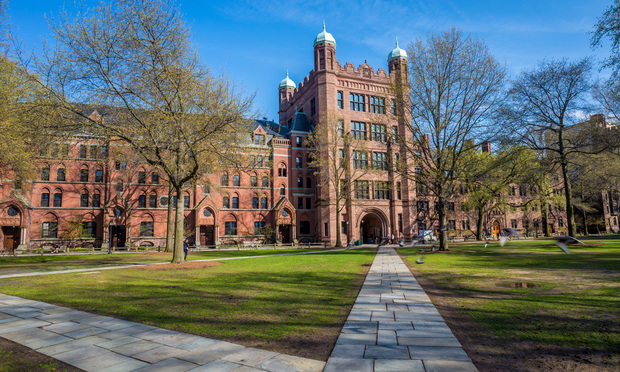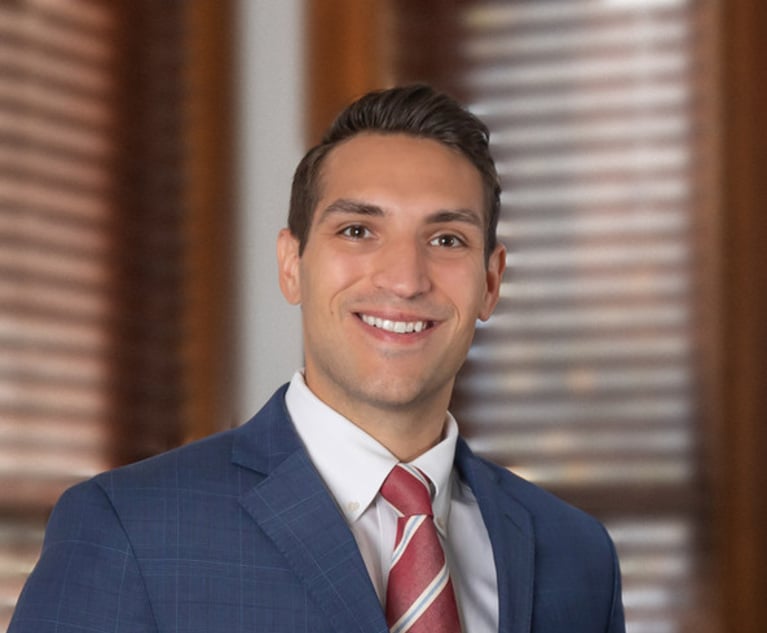Yale Law Students Help Nearly 1,600 Veterans Win Class Certification for Radiation Exposure
A group of about a dozen Yale University Law clinic students have notched a victory against the government. The U.S. Court of Appeals for Veterans Claims has certified a class of veterans that were sent to Palomares. Spain in the 1960s. Many of those veterans—who are fighting for disability benefits—are believed to have been exposed to radiation.
December 19, 2019 at 08:50 AM
5 minute read
 Yale University. (Photo: Shutterstock.com)
Yale University. (Photo: Shutterstock.com)
In a groundbreaking ruling, the Washington D.C.-based U.S. Court of Appeals for Veterans Claims has certified a class of nearly 1,600 elderly disabled American veterans exposed to ionizing radiation while cleaning up a nuclear bomb disaster in Palomares, Spain, in 1966.
The Dec. 6 decision in Victor Skaar v. Robert Wilkie, Secretary of Veterans Affairs marks the first time the U.S. Court of Appeals for Veterans Claims has certified a class on direct appeal against the Department of Veterans Affairs.
Plaintiffs in the case were assisted by about a dozen law students from the Veterans Legal Services Clinic at Yale University who worked pro bono under the direction of attorneys and Yale instructors Michael Wishnie, Aaron Wenzloff and Renee Burbank.
The lawsuit stems from the approximately 1,600 veterans who deployed to Palomares after a U.S. Air Force bomber went down in a mid-air collision, releasing four hydrogen bombs. Two of the bombs exploded conventionally, spreading plutonium radiation across the Spanish countryside.
Many of the veterans involved in the cleanup have since been afflicted with different forms of cancer and other diseases they have attributed to their service at Palomares, but the government has refused to award disability benefits, maintaining there is no proof radiation caused harm to the veterans.
The court's Dec. 6 ruling now means a three-person court panel will work with the VA to assure each veteran is evaluated for radiation-related diseases. Eligibility for benefits will be evaluated on a case-by-case basis.
In a statement, Skaar elaborated on his decadeslong fight. "For more than 50 years, the VA has denied Palomares veterans benefits for our service recovering, detecting, and removing 5,400 drums of radioactive contamination," he said. "I am happy that the court's opinion means I can continue to fight for recognition alongside my fellow Palomares veterans—many of whom are too ill to fight on their own—and their widows. I have been fighting this battle since I was 45 years old and am hopeful that the court's decision will finally allow me, at the age of 83, to receive benefits for my numerous radiation-related illnesses, including cancer."
In writing for the appeals court's majority, Judge Michael Allen said, "Our decision today heralds the beginning of an era in which we will entertain, but by no means always certify, class actions in the first instance, making us the only federal appellate court in the nation to do so. Our nation's veterans deserve no less."
The ruling covers all associated veterans who were denied claims for benefits. It also covers veterans who file for future appeals in the case. However, the ruling does not include veterans who were denied claims and did not appeal.
Three students from the Yale clinic, John Super, Meghan Brooks and Lily Halperin, discussed the case Wednesday, including how they were able to beat back the Department of Veterans Affairs and the agency's legal resources to prevail in the matter.
Super said he called Skaar at his Missouri home after the ruling and the retired Air Force chief master sergeant "was over the moon" with the ruling. Skaar has developed leukopenia, a blood disorder he attributes to being deployed to Palomares.
Meghan Brooks, who graduated from Yale Law School this year, worked on the case from its beginning 2017. "We were working with another individual, a very private person, on the case of Palomares and, while researching the matter, found a story about Palomares in the New York Times," she said. "We spoke to that reporter, reached out to other veterans to get more background on the case and eventually got in touch with Mr. Skaar."
Skaar, Brooks said, was the driving force behind a decision to file for class certification in December 2017.
"He applied for disability benefits in 1983 and was denied," Brooks said. "He has been fighting the VA for, literally, decades. At various points, he was told he was not exposed to radiation. But, he kept fighting. We learned that the legal challenges facing Mr. Skaar were not unique to him, but [faced by] all Palomares veterans."
Brooks said she spent "countless hours" on the legal case and helped file for class certification two years ago. She also gave rebuttal arguments before the court. "Basically, this was 2½ years of work for me," she said. "I did a lot of research, spoke to a lot of veterans and some widows. This ruling is just wonderful."
Lily Halperin, who will graduate from Yale Law School in the spring of 2021, said the next step is to notify eligible Palomares veterans of the court's ruling. 'We are working now on notifying the potential class members," she said. "We don't have a sense of how long this whole process now will take, but, hopefully, it will not take another two years."
Super, a U.S. Army veteran, said the court victory came down to the government acknowledging its veterans. "It's about the nation and the federal government fulfilling its promises to these veterans who raised their hand and took an oath and did their part," he said. "The government and VA need to do their part. "
Super continued: " It might be too late for some that have passed away, which is tragic, But, for those still around, it's a huge recognition. It's also giving them dignity for their service and the suffering they've encountered."
Department of Veterans Affairs Office of General Counsel attorneys Rich Daley and Mark Vichich represented the agency. Neither responded to a request for comment.
This content has been archived. It is available through our partners, LexisNexis® and Bloomberg Law.
To view this content, please continue to their sites.
Not a Lexis Subscriber?
Subscribe Now
Not a Bloomberg Law Subscriber?
Subscribe Now
NOT FOR REPRINT
© 2025 ALM Global, LLC, All Rights Reserved. Request academic re-use from www.copyright.com. All other uses, submit a request to [email protected]. For more information visit Asset & Logo Licensing.
You Might Like
View All

Apple Disputes 'Efforts to Manufacture' Imaging Sensor Claims Against iPhone 15 Technology
Trending Stories
- 1How ‘Bilateral Tapping’ Can Help with Stress and Anxiety
- 2How Law Firms Can Make Business Services a Performance Champion
- 3'Digital Mindset': Hogan Lovells' New Global Managing Partner for Digitalization
- 4Silk Road Founder Ross Ulbricht Has New York Sentence Pardoned by Trump
- 5Settlement Allows Spouses of U.S. Citizens to Reopen Removal Proceedings
Who Got The Work
J. Brugh Lower of Gibbons has entered an appearance for industrial equipment supplier Devco Corporation in a pending trademark infringement lawsuit. The suit, accusing the defendant of selling knock-off Graco products, was filed Dec. 18 in New Jersey District Court by Rivkin Radler on behalf of Graco Inc. and Graco Minnesota. The case, assigned to U.S. District Judge Zahid N. Quraishi, is 3:24-cv-11294, Graco Inc. et al v. Devco Corporation.
Who Got The Work
Rebecca Maller-Stein and Kent A. Yalowitz of Arnold & Porter Kaye Scholer have entered their appearances for Hanaco Venture Capital and its executives, Lior Prosor and David Frankel, in a pending securities lawsuit. The action, filed on Dec. 24 in New York Southern District Court by Zell, Aron & Co. on behalf of Goldeneye Advisors, accuses the defendants of negligently and fraudulently managing the plaintiff's $1 million investment. The case, assigned to U.S. District Judge Vernon S. Broderick, is 1:24-cv-09918, Goldeneye Advisors, LLC v. Hanaco Venture Capital, Ltd. et al.
Who Got The Work
Attorneys from A&O Shearman has stepped in as defense counsel for Toronto-Dominion Bank and other defendants in a pending securities class action. The suit, filed Dec. 11 in New York Southern District Court by Bleichmar Fonti & Auld, accuses the defendants of concealing the bank's 'pervasive' deficiencies in regards to its compliance with the Bank Secrecy Act and the quality of its anti-money laundering controls. The case, assigned to U.S. District Judge Arun Subramanian, is 1:24-cv-09445, Gonzalez v. The Toronto-Dominion Bank et al.
Who Got The Work
Crown Castle International, a Pennsylvania company providing shared communications infrastructure, has turned to Luke D. Wolf of Gordon Rees Scully Mansukhani to fend off a pending breach-of-contract lawsuit. The court action, filed Nov. 25 in Michigan Eastern District Court by Hooper Hathaway PC on behalf of The Town Residences LLC, accuses Crown Castle of failing to transfer approximately $30,000 in utility payments from T-Mobile in breach of a roof-top lease and assignment agreement. The case, assigned to U.S. District Judge Susan K. Declercq, is 2:24-cv-13131, The Town Residences LLC v. T-Mobile US, Inc. et al.
Who Got The Work
Wilfred P. Coronato and Daniel M. Schwartz of McCarter & English have stepped in as defense counsel to Electrolux Home Products Inc. in a pending product liability lawsuit. The court action, filed Nov. 26 in New York Eastern District Court by Poulos Lopiccolo PC and Nagel Rice LLP on behalf of David Stern, alleges that the defendant's refrigerators’ drawers and shelving repeatedly break and fall apart within months after purchase. The case, assigned to U.S. District Judge Joan M. Azrack, is 2:24-cv-08204, Stern v. Electrolux Home Products, Inc.
Featured Firms
Law Offices of Gary Martin Hays & Associates, P.C.
(470) 294-1674
Law Offices of Mark E. Salomone
(857) 444-6468
Smith & Hassler
(713) 739-1250












